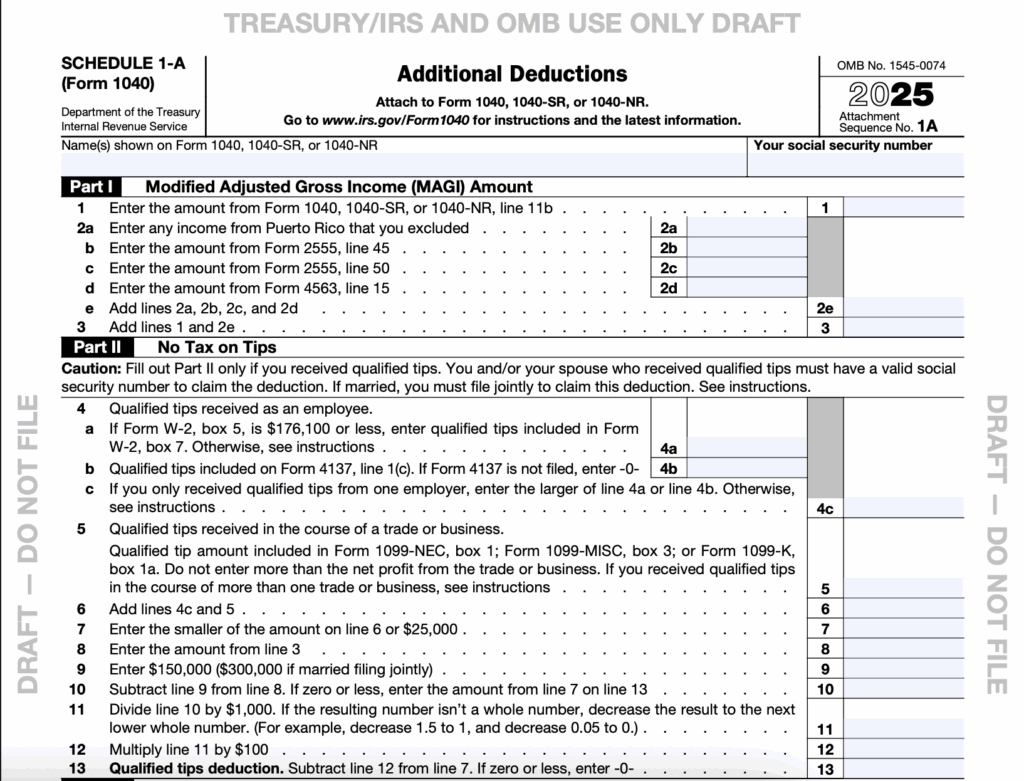New IRS Schedule 1-A: What It Means for US Expats in 2025

The IRS has released a draft version of a brand-new form — Schedule 1-A (Form 1040) — for the 2025 tax year. Once finalized, this form will be used during the 2026 filing season. Schedule 1-A was created after the One Big Beautiful Bill Act (OBBBA) introduced temporary deductions for tips, overtime pay, car loan interest, and seniors.
For US expats, the form matters less for the deductions themselves — which are often hard to use abroad — and more for how it interacts with the Foreign Earned Income Exclusion (FEIE) and other exclusions when calculating Modified Adjusted Gross Income (MAGI). MAGI is the income measure the IRS uses to determine eligibility for many credits and deductions.
If you’re unsure how these draft changes affect your expat taxes, Greenback’s team of expert accountants can review your situation and make sure you maximize every deduction you’re entitled to. Create an account to get started.
Why Did the IRS Draft Schedule 1-A?
In July 2025, Congress passed the OBBBA, which temporarily added four deductions for tax years 2025–2028. Rather than squeeze these onto existing forms, the IRS drafted Schedule 1-A (Additional Deductions).
Related Article: Trump’s 2025 Tax Policies: What U.S. Expats Need to Know
Taxpayers will use Schedule 1-A alongside Form 1040, 1040-SR, or 1040-NR starting with their 2025 return filed in 2026.
What Deductions Are on Draft Schedule 1-A?
The draft Schedule 1-A covers four new deductions:
- Tips Deduction
- It lets people deduct qualified tips reported on a W-2 or 1099.
- Transitional rules apply for 2025: the IRS won’t update W-2 codes until 2026, so employees may need to rely on their own records.
- For self-employed individuals, the deduction can’t exceed net business profit.
- Why most expats can’t use it: Foreign employers generally don’t have US-compliant tip systems, can’t withhold US payroll taxes, and often operate under labor laws that don’t recognize US tip reporting requirements.
- Overtime Deduction
- Covers overtime pay reported on a W-2.
- Again, transitional: employees may need to calculate based on their own records in 2025.
- Rarely applies to contractors, since “overtime” is a legal concept tied to US labor law.
- Why most expats can’t use it: Foreign employers don’t follow US overtime laws or payroll systems, making it nearly impossible to qualify.
- Car Loan Interest Deduction
- Allows up to $10,000 in interest paid on qualifying US passenger vehicle loans.
- Only applies to certain loans from US lenders.
- The only OBBBA deduction available, if you’re married and filing separately.
- Why most expats can’t use it: Loans from foreign banks aren’t eligible, so unless you still finance a US-based vehicle, this deduction won’t apply abroad.
- Enhanced Senior Deduction
- Adds up to $6,000 per taxpayer born before Jan. 2, 1961 (up to $12,000 for joint filers).
- Phased out starting at $150,000 MAGI (single) or $250,000 MAGI (joint).
- Why some expats may lose out: Even if you exclude income with FEIE, those amounts are added back into MAGI for this deduction — pushing many retirees abroad above the threshold.
Learn more about US Expat Deductions and Credits.
The Expat Angle: What Really Matters
- Excluded income still counts. Schedule 1-A explicitly requires adding back amounts excluded under the FEIE (Form 2555), the Puerto Rico exclusion, and the American Samoa exclusion. Even if excluded income isn’t taxed, it still raises your MAGI and can phase out your eligibility.
- Most deductions don’t translate abroad. Expats working for foreign employers usually can’t qualify for the tips or overtime deductions because foreign employers don’t comply with US reporting rules. Car loan interest rarely applies unless you maintain a US loan.
- Seniors may benefit. The enhanced senior deduction applies abroad, but only if your MAGI (with excluded income added back) stays under the thresholds.
Who doesn’t love a tax break? Download our easy-to-use excel calculator to get an estimate of how the foreign earned income exclusion can save you money.
"*" indicates required fields

Draft Status: What Happens Next
This current version of Schedule 1-A is still a draft and is not intended for use yet. Here’s what to expect:
- Early Preview: Drafts are published so taxpayers and software providers can prepare.
- Comments: Feedback can be sent via IRS.gov/FormsComments.
- OMB Approval: The Office of Management and Budget (OMB) must approve the form before it’s final.
- Final Release: The approved form will be posted at IRS.gov/LatestForms.
Key takeaway: The deductions are law under OBBBA, but the form and instructions may change before 2026. Always use the final version.
Clearing Up the Confusion: Schedule A vs. Schedule 1 vs. Schedule 1-A
- Schedule A (Form 1040): Covers itemized deductions like mortgage interest and charitable gifts.
- Schedule 1 (Form 1040): Covers additional income and adjustments like unemployment, IRA contributions, and student loan interest.
- Schedule 1-A (Form 1040): Brand new in 2025. Covers only the four OBBBA deductions.
Don’t mix them up. Schedule 1-A is not an update to the others — it’s a separate, new schedule.
The new draft Schedule 1-A highlights just how complex expat tax rules can be. Most of these deductions won’t apply abroad — but expats still have powerful tools like FEIE and the FTC to reduce their US tax bill.
Ready to make sure you’re covered? Get started with Greenback today and let our expat tax experts handle the details for you.
Frequently Asked Questions About Schedule 1-A
Is Schedule 1-A final yet?
No. The IRS has only released a draft.
When will I first use it?
With your 2025 return, filed in 2026, once the final version is published.
Does it change how FEIE works?
No, but excluded income is counted toward MAGI, which can reduce eligibility for the new deductions.
Are the deductions permanent?
No. They’re temporary under OBBBA and currently set to expire after 2028.
The Bottom Line
Draft Schedule 1-A shows how the IRS plans to handle new OBBBA deductions. For most expats, the deductions themselves will be out of reach — but the MAGI calculation rules matter. If you claim FEIE or other exclusions, those amounts can still phase you out of benefits.
Greenback will continue to monitor the IRS process so you know when the final form is released and how it applies to your expat tax return.
This article provides general information about expat tax strategies. Tax situations vary significantly, and professional guidance is recommended for optimal planning. Consult with a qualified expat tax professional to determine the best strategy for your specific circumstances.
